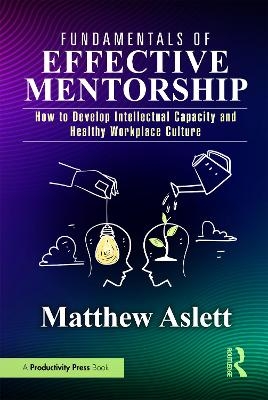
Fundamentals of Effective Mentorship
Productivity Press (Verlag)
978-1-032-71521-6 (ISBN)
- Lieferbar (Termin unbekannt)
- Versandkostenfrei
- Auch auf Rechnung
- Artikel merken
In an ever-changing environment, organizations must identify and implement numerous decisions about strategic and operational activities. Organizations must consider research and development, financial planning, data analytics, information technology, marketing, and production. However, organizational leaders must not neglect the importance of a critical element which is human resources. Cultivating intellectual capacity and a healthy workplace culture can guide an organization to leverage unique abilities, achieve meaningful objectives, and maximize the possibility of sustainable success. As a result, the ability to encourage two-way learning relationships through mentorship can help organizations to improve effectiveness.
A mentorship program can empower mentors, mentees, and program leaders to share best practices. The mentorship process is integral for promoting the professional and personal growth of stakeholders within an organization. Through a program tailored specifically to organizational needs, the implications of effective mentorship could positively impact individuals, groups, institutions, and broader communities. Mentorship can occur both formally and informally in diverse areas such as education, business, medicine, law, engineering, technology, arts, sciences, and multi-disciplinary domains.
This book communicates considerations for the facilitation of mentorship programs and the development of mentorship relationships based on experiences from a practitioner lens. Readers are reintroduced to mentorship and will learn about the value that can be created for an organization. The exploration of identities, possible outcomes, approaches, and accessibility can spark ideation about recommendations for the reader's organizational context. Readers will embark on a journey to generate new or challenge existing insights through reflective guiding questions.
Matthew F. Aslett is a Sessional Professor at the College of Education, Niagara University, Ontario, Canada, and a Secondary Teacher in Business and Mathematics at Halton Catholic District School Board, Ontario, Canada. He achieved his Bachelor of Commerce (Honours) in 2019 and Master of Science in Management (Organizational Behaviour) in 2020 at Smith School of Business, Queen’s University, Ontario, Canada. He completed an exchange semester in Fall 2017 at Bocconi University, Milan, Italy. He earned his Bachelor of Professional Studies in Education in 2022 at Niagara University, Ontario, Canada, with specializations in Business Studies General and Entrepreneurship for Intermediate and Senior Divisions. As an Ontario Certified Teacher, he has additional qualifications in Mathematics, Religion, Special Education, Co-operative Education, Guidance, Careers, Junior Division, and Mentoring. He is currently concluding his Doctor of Philosophy in Leadership and Policy at Niagara University, New York, United States of America, with anticipated convocation in 2025. He was a recipient of the Queen’s University Chancellor’s Scholarship in 2015, the Ontario Coaching Excellence Award in 2021, the Oakville Community Spirit Award in 2021, and the Niagara University Excellence in Teacher Preparation Award in 2022. He has supported post-secondary program delivery as a Head Teaching Assistant for undergraduate and graduate courses at Queen’s University. His professional experiences include Learning Facilitator at Coaches Association of Ontario and Ontario Soccer, and Assessor Club Development at Ontario Soccer. He was previously a Match Official Assignment and Mentor Coordinator, where he managed 350+ officials and 20+ mentor supervisors. His research, teaching, and service interests include mentorship programs and educational leadership.
Chapter 1: Mentorship Defined Chapter 2: Participant Identities and Responsibilities 3. Chapter 3: Signals to Start Mentorship Programs Chapter 4: Outcomes for Mentees, Mentors, and Communities Chapter 5: Mentorship Styles and Philosophies 6. Chapter 6: Building Relationships and Establishing Norms Chapter 7: Before, During, and After Mentorship Chapter 8: Verbal and Written Feedback 9. Chapter 9: Improve Engagement with Effective Questions Chapter 10: Self-Assessment Scorecard Chapter 11: Equity, Diversity, and Inclusivity in Mentorship Chapter 12: Transitioning from Mentee to Mentor to Program Leader
| Erscheinungsdatum | 21.11.2024 |
|---|---|
| Zusatzinfo | 78 Line drawings, black and white; 78 Illustrations, black and white |
| Verlagsort | London |
| Sprache | englisch |
| Maße | 178 x 254 mm |
| Themenwelt | Wirtschaft ► Betriebswirtschaft / Management ► Logistik / Produktion |
| Wirtschaft ► Betriebswirtschaft / Management ► Personalwesen | |
| Wirtschaft ► Betriebswirtschaft / Management ► Unternehmensführung / Management | |
| Wirtschaft ► Volkswirtschaftslehre | |
| ISBN-10 | 1-032-71521-9 / 1032715219 |
| ISBN-13 | 978-1-032-71521-6 / 9781032715216 |
| Zustand | Neuware |
| Haben Sie eine Frage zum Produkt? |
aus dem Bereich


